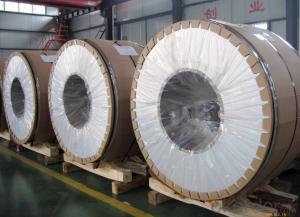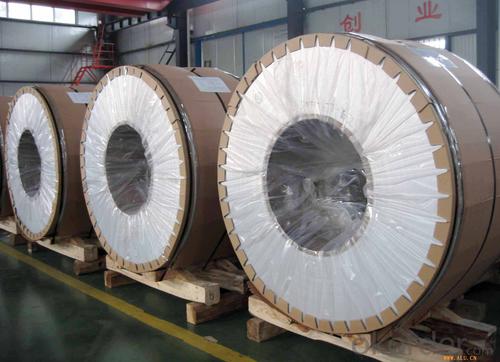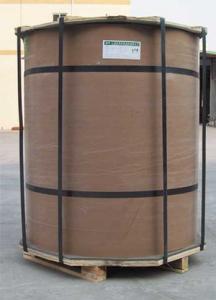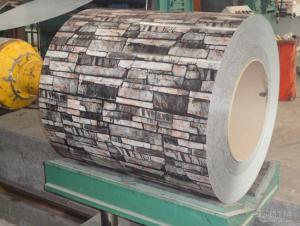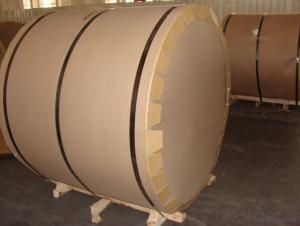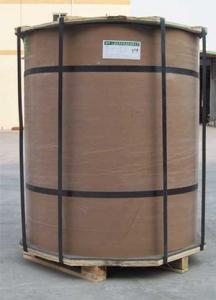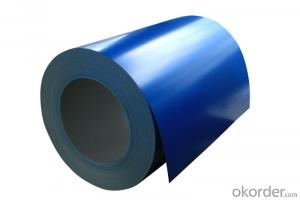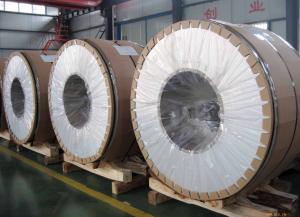Color Coated 5xxx Mill-Finished Aluminum Coil
- Loading Port:
- China Main Port
- Payment Terms:
- TT OR LC
- Min Order Qty:
- -
- Supply Capability:
- -
OKorder Service Pledge
OKorder Financial Service
You Might Also Like
Specifications
Aluminum coil
1.Fine craftsmanship
2.Durable
3.Easy processing
aluminum coil
color coated aluminum coil
embossed aluminim coil
| Alloy NO. | 1000series: 1050 1060 1070 1100 1200 1235 3000series: 3003 3004 3105 3A21 5000series: 5052 5083 5754 |
Temper | O\H12\H14\H16\H18\H22\H24\H26\H32\H34 |
Specification | thickness:0.2mm-10.0mm Width:90mm-1600mm |
Surface treatment | coated,polished,embossed, etc |
Colors | Customized |
Features | High weather resistance \anti scratch anticorrosion \ subtle edges and elegant appearance \ easy processing and installation\ high brightness and hardness. |
Application |
Construction /Furniture/decorate/industry,etc. |
Package | Standard seaworthy export packing: wooden pallets with plastics protection |
Payment terms | 30% TT deposit, 70% TT before shipment . |
Delivery time | About 25-30 days after receiving the deposit |
MOQ | 5 metric tons |
- Q: Can aluminum coils be used in the production of electrical conductors?
- Yes, aluminum coils can be used in the production of electrical conductors. Aluminum is an excellent conductor of electricity, with approximately 61% conductivity compared to copper. It is lightweight, cost-effective, and has a high melting point, making it suitable for various electrical applications. Aluminum coils are commonly used in the manufacturing of power transmission lines, electrical cables, and transformer windings. However, it is worth noting that aluminum has a lower tensile strength compared to copper, so it may require a larger cross-sectional area to achieve the same electrical conductivity. Additionally, aluminum coils may require additional surface treatments or coatings to prevent oxidation and ensure long-term performance.
- Q: How do aluminum coils compare to other metals in terms of strength?
- Aluminum coils have excellent strength-to-weight ratio compared to many other metals. While aluminum is not as strong as steel, it is lighter and more flexible, making it a popular choice in various applications. Aluminum coils can withstand significant forces without breaking or deforming, making them suitable for a wide range of industries, including automotive, aerospace, and construction. Additionally, aluminum coils have good corrosion resistance, which further enhances their durability and longevity. However, it is important to note that the strength of aluminum can vary depending on the alloy and temper used, so specific comparisons should be made based on the particular application and requirements.
- Q: Is it possible to join steel coils using arc welding or gas welding techniques?
- <p>Yes, steel coils can be welded together using both arc welding and gas welding methods. Arc welding, specifically processes like Shielded Metal Arc Welding (SMAW) and Gas Metal Arc Welding (GMAW), is commonly used for joining steel due to its strength and versatility. Gas welding, which uses a fuel gas and an oxygen mixture to produce a flame, is also suitable for steel welding, although it may be less common in industrial settings due to the higher heat input and potential for distortion. Proper techniques and equipment are essential to ensure a strong, durable weld and to avoid defects such as cracking or warping.</p>
- Q: Is it possible to utilize aluminum coils for crafting artistic installations or distinctive creations?
- <p>Yes, aluminum coils can be used to create art installations and other unique creations. Their malleability, durability, and lightweight nature make them ideal for sculptural works. Artists can bend, shape, and weld aluminum coils into various forms, offering a wide range of design possibilities. The material's reflective surface can also add visual interest, especially when used in installations that interact with light and shadow. Additionally, aluminum's resistance to corrosion makes it suitable for outdoor art pieces, ensuring longevity and low maintenance.</p>
- Q: I have a diamond back bike with an aluminum frame. will it rust if i ride or put it in the frame? is it bad for the bike?
- sophisticated task. search onto a search engine. this can help!
- Q: What are the different surface treatment options available for aluminum coils?
- There are several surface treatment options available for aluminum coils, including anodizing, painting, powder coating, and laminating. Anodizing involves creating a protective oxide layer on the surface of the aluminum, providing increased durability and corrosion resistance. Painting allows for a wide range of colors and finishes, while powder coating offers a more durable and environmentally friendly option. Laminating involves applying a protective film to the surface of the coil, providing added protection and enhancing its appearance.
- Q: Can aluminum coils be used in high-humidity environments?
- Yes, aluminum coils can be used in high-humidity environments. Aluminum is a corrosion-resistant metal, making it suitable for applications in areas with high humidity levels. The natural oxide layer that forms on the surface of aluminum acts as a protective barrier against moisture and prevents the metal from rusting or corroding. This makes aluminum coils a popular choice for HVAC systems, where they are exposed to moisture and humidity on a regular basis. Additionally, aluminum coils are lightweight, durable, and have excellent heat transfer properties, making them an ideal choice for various industrial and commercial applications in high-humidity environments.
- Q: Is it easy to bend aluminum coils and what factors affect their flexibility?
- <p>Aluminum coils are relatively easy to bend due to their malleability and flexibility. However, the ease of bending can vary depending on the alloy type, thickness, and temper of the aluminum. Thinner gauges and softer tempers are generally easier to bend. The process can be done manually or with machinery, and it's important to consider the coil's width and the radius of the bend to avoid cracking or other damage.</p>
- Q: Domestic production of color coated aluminum coil manufacturers which good?
- Color coated aluminum coil has two kinds of polyester color coating and fluorocarbon coating. It is widely used in the field of architectural decoration, such as aluminum ceiling, aluminum plate and so on. There are many manufacturers of color coated aluminum rolls, big and small.
- Q: How are aluminum coils protected against moisture during storage?
- Aluminum coils are typically protected against moisture during storage by being wrapped in a moisture-proof material, such as plastic or a moisture barrier film. Additionally, they are often stored in a dry and controlled environment to prevent any moisture absorption.
Send your message to us
Color Coated 5xxx Mill-Finished Aluminum Coil
- Loading Port:
- China Main Port
- Payment Terms:
- TT OR LC
- Min Order Qty:
- -
- Supply Capability:
- -
OKorder Service Pledge
OKorder Financial Service
Similar products
Hot products
Hot Searches
Related keywords
